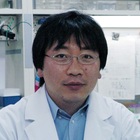- HOME
- Researchers
- Naoya Fujita, Ph.D.
Naoya Fujita, Ph.D.
Affiliation

Cancer Chemotherapy Center, Director's Room Center Director
Contact
3-8-31, Ariake, Koto-ku, Tokyo 135-8550, Japan
TelüF81-3-3570-0481
FaxüF81-3-3570-0484
MailüFnaoya.fujita@jfcr.or.jp
Education & Professional Career
Mar. 1990 Graduated from The University of Tokyo, Faculty of Pharmaceutical Sciences (B. Pharm. Sci.)
Apr. 1990–Mar. 1992 Postgraduate School, Faculty of Pharmaceutical Sciences, The University of Tokyo (M. Pharm. Sci.)
Apr. 1992–Mar. 1995 Postgraduate School, Faculty of Pharmaceutical Sciences, The University of Tokyo
(Ph.D.; the Degree of Doctor of Pharmaceutical Sciences)
(Thesis: Regulation of lymphatic metastasis and apoptosis by cell-cell interaction. Prof. T. Tsuruo)
Apr. 1994–Mar. 1995 Doctor Course Fellow: Fellowships of the Japan Society for the Promotion of Science
for Japanese Junior Scientists.
Apr. 1995–Mar. 2001 Assistant Professor, Laboratory of Biomedical Research, Department of Chemical Biology,
Institute of Molecular and Cellular Biosciences, The University of Tokyo
Apr. 2001–Jul. 2004 Assistant Professor, Laboratory of Cell Growth and Regulation, Department of Cell Biology,
Institute of Molecular and Cellular Biosciences, The University of Tokyo
Aug. 2004–Jun. 2006 Associate Professor, Laboratory of Cell Growth and Regulation, Department of Cell Biology,
Institute of Molecular and Cellular Biosciences, The University of Tokyo, Associate Professor,
Graduate School of Medicine, The University of Tokyo
Oct. 2004–Jun. 2006 Associate Professor, Department of Medical Pharmaceutics,
Graduate School of Pharmaceutical Sciences, The University of Tokyo
Apr. 2005–Jun. 2006 Associate Professor, Department of Medical Genome Sciences, Graduate School of Frontier Sciences,
The University of Tokyo
Jul. 2006–present Chief, Division of Experimental Chemotherapy, Cancer Chemotherapy Center,
Japanese Foundation for Cancer Research
Sep. 2008–present Invited Professor, Department of Medical Oncology, Institute of Health Biosciences,
The University of Tokushima Graduate School
Apr. 2010–present Invited Professor, Department of Medical Genome Sciences, Graduate School of Frontier Sciences,
The University of Tokyo
Apr. 2013–Dec. 2014 Vice Director, Cancer Chemotherapy Center, Japanese Foundation for Cancer Research
Jan. 2015–present Center Director, Cancer Chemotherapy Center, Japanese Foundation for Cancer Research
Area of Research
üECancer Chemotherapy
üECell Biology
Membership
üEAmerican Association for Cancer Research
üEThe Japanese Cancer Association
üEThe Japanese Association for Metastasis Research
üEThe Japanese Association for Molecular Target Therapy of Cancer
Awards
üEAward of the Japanese Association for Metastasis Research for the Young Investigators (April 4, 1997)
üEThe Incitement Award of the Japanese Cancer Association (October 2003)
Research Projects
Molecular mechanisms of survival signaling pathways
The serine/threonine kinase Akt is a key molecule for protecting cells from undergoing apoptosis. Several experiments have suggested that the Akt-mediated survival-signaling pathway is an attractive target for cancer chemotherapy. First, amplification of the akt gene occurs in some tumors; second, loss of the tumor suppressor PTEN gene is common in tumors and its loss constitutively activates Akt. Screening of anticancer drugs that could down-regulate the phospho-Akt level and the Akt kinase activity revealed that UCN-01 and Hsp90 inhibitors possessed the ability to interfere Akt pathway. These results strongly suggested that Akt-mediated survival-signaling pathway is a promising and an attractive target for cancer chemotherapy. To identify new molecular targets for developing new anti-cancer drugs, we screened PDK1/Akt binding partners and found that Aki1, CKIP-1, Hsp90, TUSC4 et al. were the regulators of Akt signaling pathways. I am also studying serine/threonine kinase Pim by analyzing the 3D structure of the Pim-1/p27Kip1 crystal.
Aggrus: a platelet aggregation-inducing factor that is associated with hematogenous metastasis
Platelet adhesive glycoprotein receptors and their counterparts expressed on tumor cells participate in tumor-induced platelet aggregation, which may be an early step in the development of a metastatic lesion. We have previously characterized the platelet aggregation-inducing sialoglycoprotein (Aggrus) overexpressed in highly metastatic tumors. We recently identified that Aggrus is identical to podoplanin that is known as a lymphatic endothelial cell marker. Expression of Aggrus induced platelet aggregation without requiring plasma components. The aggrus mRNA expression is found to be frequently upregulated in seminomas and in lung squamous cell carcinomas. These results suggest that Aggrus/podoplanin is a newly identified platelet aggregation-inducing factor that promotes the formation of pulmonary metastasis. We are now developing neutralizing anti-Aggrus antibodies and Aggrus-inhibitory drugs. We are also analyzing newly identified metastasis-promoting factor Merm1.
Targeting cancer stem cells and their regulation
During the cancer chemotherapy, the "Relapse" makes it difficult to achieve complete cure of cancer. It is thought that present anti-cancer drugs could not kill small population of cancer cells. The cells were called “cancer stem cells”. They were known to possess stem cell like properties. Therefore, we are now trying to clarify the properties of the cancer stem cells and to find the new strategies to kill cancer stem cells. We recently reported that a drug transporter ABCG2 and miR-21 were associated with multidrug resistant phenotype in cancer stem cells.




